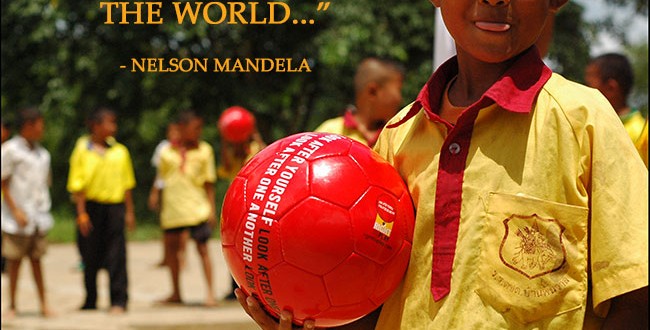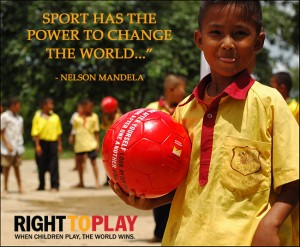Peacebuilding through sport
Sport for peacebuilding dovetails well with Johan Galtung’s 3 Rs for holistic peacebuilding – reconstruction, reconciliation and resolution.
| Suggested Reading | Conflict Background | GCCT |
By Phillip Nyasha Fungurai
Sport is an international language which transcends ethnic, religious, national and other barriers that drive conflict and negative peace, making it a powerful tool for peacebuilding. With the conflict rife around the world, the time is ripe to fully engage sport as a vehicle for peacebuilding. Sport provides a significant avenue for social cohesion, social capital consolidation, occupational therapy and psycho-social support, which are fundamental aspects of holistic peacebuilding. Most of the values inherent in sport like resilience, fair play, cooperation and respect further present a hub of opportunities which render sport an effective peacebuilding apparatus. The United Nations Inter Agency Taskforce on Sport for Development and Peace (2003) affirms the pivotal role of sport in peacebuilding where it asserts that sport facilitates a healing process which reestablishes a sense of normalcy. It therefore presents an ideal forum for resuming social dialogue, building understanding, bridging divides between conflicting groups, breaking down prejudice, appreciating ethno-religious diversity, strengthening community involvement and channeling energies from aggression and self-destruction to productive and constructive ends.
Sport is an important aspect of socio-political life. It can be employed to directly engage conflicting parties and victims of conflict, bringing them together in a participatory way. This is important in building social capital and strengthening social fabric. Sport thus brings people together in a way that cuts across boundaries and breaks down barriers, making the playing field a simple and often apolitical site for initiating contact between hostile groups. It is therefore an ideal forum for establishing dialogue by making hostile groups understand each other’s identities, religions, values and cultures. The social interaction instigated by sport also sets in motion political interaction. Political interaction will result in adjusting of incompatible interests and ideologies, thus generating an enabling environment for peacebuilding. Strife and war torn regions like Sudan can exploit a phenomenon like sport to set in motion holistic peacebuilding that can stabilize the country. For example a football match between the North and the South, with both teams intermixed with the varying ethnic groups in the country. This will result in social interaction that will foster the embracing of diversity, breaking down of prejudice and achievement of positive sustainable peace.
Many of the core values inherent in sport resonate well with the principles necessary for holistic peacebuilding. These range from fairness, sharing of resources, cooperation, respect and tolerance. Hence when applied robustly, sport programmes can help reduce tension. The convening power of sport makes it a powerful tool for peacebuilding. As a natural crowd puller, sport is perfect for social mobilization. In turn excellent social mobilization is a great ingredient for enhancing community participation and involvement in peace processes.
Sport further nurtures in people the value of effort and how to manage victory as well as defeat. This is particularly important as it teaches conflicting parties to handle political defeats, and creating win-win situations in times of conflict to avert explosive violent confrontations. The process of rebuilding the ability to trust in conflict-ridden areas is also a daunting challenge. In this light, sport can play a pivotal role in facilitating healing and reconciliation that is essential for gradual but certain reestablishment of trust. Imagine an anti-xenophobic football match between Zimbabwe and South Africa. Such a match would make fruitful strides towards ameliorating xenophobic tendencies and violence based on nationality. The match will spark healthy social interaction between foreigners hence breaking down prejudice and societal boundaries.
By engaging in sport together, conflicting groups can increasingly grow to feel that they are alike. This shared experience can give birth to shared ritual identity which can mitigate tension and hostility. This in turn will facilitate bonding. For example, the net effect of the Darfur crisis has been the displacement of over 1.6 million and over 210,000 refugees crossing the border into Chad alone. This has led to ethnic clashes between the local population and the refugees which has made youth vulnerable to terrorist recruitment. In response to this predicament and in the peacebuilding spirit, a humanitarian organization called ‘Right to Play’ embarked on a project that uses sport to build life skills among refugee youth and local youth. This has promoted community cohesion and a united voice against violent conflict by youth in the region. The sport project has also been a form of occupational therapy which has averted the recruitment of youth by terrorist as they have something occupying them. This bears concrete testimony to the fact that, sport is an effective peace building tool.
The conciliatory nature of sport also contributes immensely to peacebuilding. Sport for peacebuilding dovetails well with Galtung’s 3 Rs for holistic peacebuilding. These entail reconstruction, reconciliation and resolution. Reconstruction involves rehabilitating structures as well as victims of conflict. In this regard sport assists in the reintegration of conflict combatants and victims by providing psycho-social support. Reconciliation employs sport’s conciliatory character to rebuild plausible relationships, establishing positive sustainable peace. The resolution of conflict can be achieved by using sport to promote dialogue, starting with social interaction.
However it is essential to harness these positive aspects of sport carefully because it also has its own challenges. Neo-conflict theorists contend that sport is a by-product of development and thus can never be an engine for peace. Such theorists argue that sport is a social construct which has ills like hooliganism and exclusionary practices that are impediments to holistic peacebuilding. This school of thought is misguided because sport is one of the only means through which conflicts can be transformed to be potentially a positive and fruitful force of constructive change.
Phillip Nyasha Fungurai is a researcher who holds a BSc Honours Degree in Peace and Governance from Bindura University of Science Education. He is also a peace, governance, human rights and democracy specialist, working in co-operation with civil society organizations, think tanks and research institutes in Zimbabwe. The arguments herein are the author’s views, thus no institution should be held accountable for the contentions in this article.





















RT @TransConflict: #Peacebuilding through #sport: Sport for peacebuilding dovetails well with Johan #Galtung’s 3 Rs – http://t.co/kb8C1hAnYi
RT @TransConflict: #Peacebuilding through #sport: Sport for peacebuilding dovetails well with Johan #Galtung’s 3 Rs – http://t.co/kb8C1hAnYi
RT @TransConflict: #Peacebuilding through #sport: Sport for peacebuilding dovetails well with Johan #Galtung’s 3 Rs – http://t.co/kb8C1hAnYi
RT @gcct_tc: #Peacebuilding through #sport: Sport for peacebuilding dovetails well with Johan #Galtung’s 3 Rs – http://t.co/NKRhshndto
RT @gcct_tc: #Peacebuilding through #sport: Sport for peacebuilding dovetails well with Johan #Galtung’s 3 Rs – http://t.co/NKRhshndto
RT @TransConflict: #Peacebuilding through #sport: Sport for peacebuilding dovetails well with Johan #Galtung’s 3 Rs – http://t.co/kb8C1hAnYi
RT @TransConflict: #Peacebuilding through #sport: Sport for peacebuilding dovetails well with Johan #Galtung’s 3 Rs – http://t.co/kb8C1hAnYi
RT @gcct_tc: #Peacebuilding through #sport: Sport for peacebuilding dovetails well with Johan #Galtung’s 3 Rs – http://t.co/NKRhshndto
@gcct_tc @TransConflict Sad FIFA enmeshed by corruption scandal. Bureaucracy Hierarchy. Learn Embrace Change Stop Greed & return to games
RT @TransConflict: #Peacebuilding through #sport: Sport for peacebuilding dovetails well with Johan #Galtung’s 3 Rs – http://t.co/kb8C1hAnYi
Peacebuilding through sport http://t.co/EEXtOfanUI #Nonprofit
RT @Aktivizmo: Peacebuilding through sport http://t.co/EEXtOfanUI #Nonprofit
RT @Aktivizmo: Peacebuilding through sport http://t.co/EEXtOfanUI #Nonprofit
RT @TransConflict: #Peacebuilding through #sport: Sport for peacebuilding dovetails well with Johan #Galtung’s 3 Rs – http://t.co/kb8C1hAnYi
Peacebuilding through sport – TransConflict – http://t.co/YzdLoK160c Rural Zimbabwe 1990’s plastic bags used to create Ball & kids played
Peacebuilding through sport – TransConflict – http://t.co/YzdLoK160c Why O Why sexual abusers corrupt ple permeating culture of Good/Peace
@Aktivizmo @TransConflict @GerryAdamsSF @M_McGuinness_SF @tourismireland @NITouristBoard @carlbildt @calestous @andrewmmadden @RT_com
RT @Aktivizmo: Peacebuilding through sport http://t.co/EEXtOfanUI #Nonprofit
RT @Aktivizmo: Peacebuilding through sport http://t.co/EEXtOfanUI #Nonprofit
RT @TransConflict: #Peacebuilding through #sport: Sport for peacebuilding dovetails well with Johan #Galtung’s 3 Rs – http://t.co/kb8C1hAnYi
RT @gcct_tc: #Peacebuilding through #sport: Sport for peacebuilding dovetails well with Johan #Galtung’s 3 Rs – http://t.co/NKRhshndto
Pingback : Top 15 GCCT articles of 2015 - TransConflict